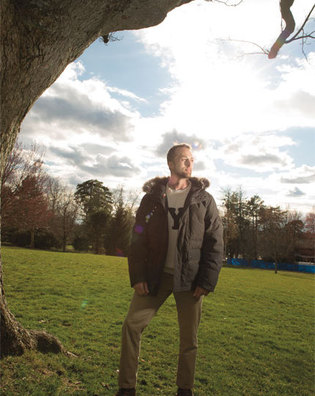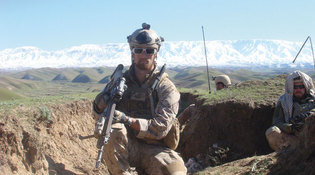 loading
loading
War and after Mark OstowView full image Courtesy Ryan PearsonRyan Pearson ’17 (shown above in Faryab Province, Afghanistan, in 2012) joined the Navy on September 10, 2001, to escape a difficult home life. View full imageCollege studentRyan Pearson ’17, political science major in Yale’s Eli Whitney program for nontraditional college students. Age: 31. Navy: active duty 2002–2014 and Navy Reserve 2014 to present. Deployed to Afghanistan in 2011 and 2012. When Ryan Pearson returned from months of disarming bombs in Afghanistan, he began to consider why veterans feel estranged when they get home. Pearson explains it this way: throughout history, warriors have entered a “parallel culture.” In this culture, they learn to regard killing the enemy as virtuous; they face recurrent reminders of death; and they come to feel surpassing love for one another. In contrast, in the civilian culture to which contemporary warriors return, people consider killing immoral, avoid thinking about death, and see friendships as contingent, not unconditional. For some veterans, “The biggest sacrifice is not that you could lose life and limb, but that once you’ve been indoctrinated in a warrior culture, your worldview is forever altered,” says Pearson. “You will always be different, different in a way that civilian society will never understand.” Pearson says most people don’t anticipate this when they sign up. “Only once you become a civilian again do you understand these challenges.” Pearson elaborates on these dissonances. In combat, killing the enemy is “a consummation of years of training.” And on the battlefield, even if not everybody viscerally accepts the reality of their own death, Pearson says, “they are brutally confronted” by its possibility. At home, equally mortal civilians can tell themselves that they will die “way down the road” and that they will cope with it then. Through that confrontation with death, Pearson discovered that “when you have internalized the inescapable truth that you’re going to die someday, you’re liberated from it. Death holds no sway over you. This is where war becomes fun. There’s this strange paradox about our existence, that the closer you get to dying, the more alive you feel.” He compares that exhilaration to looking down from the lip of the Grand Canyon. Nowadays, he skydives, snowboards, and climbs cliffs “to help me get back to the same place. It’s cheating death.” The word “brother” is shorthand for the bonding among people in combat. “Brother is a term of distinction that you have to earn,” says Pearson. “This is forged in the mutual understanding that if it came to it, [a fellow warrior] would hop on a grenade for me.” A brother will say, “If someone is going to step on an IED, I hope it’s me”—and, Pearson says, “they mean that in all sincerity. It’s that love for their brother that compels them to do what most of us conceive of as an absolutely insane thing.” It doesn’t matter, he says, that “sometimes you’re on good terms and sometimes you absolutely hate each other. You can call it a very Christian definition of love.” In ordinary life, friendships wax and wane. Pearson would discourage civilians from pitying the men and women who have served in Iraq and Afghanistan, even as he grieves the loss of friends. “We all made a free-will decision, and they died a warrior’s death. They served something greater than themselves, whether it was their country or the brother to their right or their left. There’s a beautiful nobility in that.” Pearson joined the Navy as a ticket out of the life he was born into. As a child in San Diego, he says, “I often went hungry. My family members would disappear for days at a time. I got passed back and forth like a basketball because my two parents would realize how dysfunctional they were. I grew up kind of feral.” When he enlisted—on September 10, 2001—he was a high school senior with a 2.0 grade average. In the Navy, “I caught on very quickly that I could do more than what I was doing. I developed a hunger for excellence. The trials and challenges I faced in the military allowed me to grow as a warrior, but I eventually turned towards Yale because I wanted to grow as an intellectual. At Yale I’m finding the same kind of rigor and challenge I found in the military, only for that other component of my being.” After graduation, he hopes to provide security for humanitarian groups in danger zones or to join the Foreign Service. He still serves in the Navy Reserve. Will he be deployed again? “God willing,” Pearson replies.
|
|